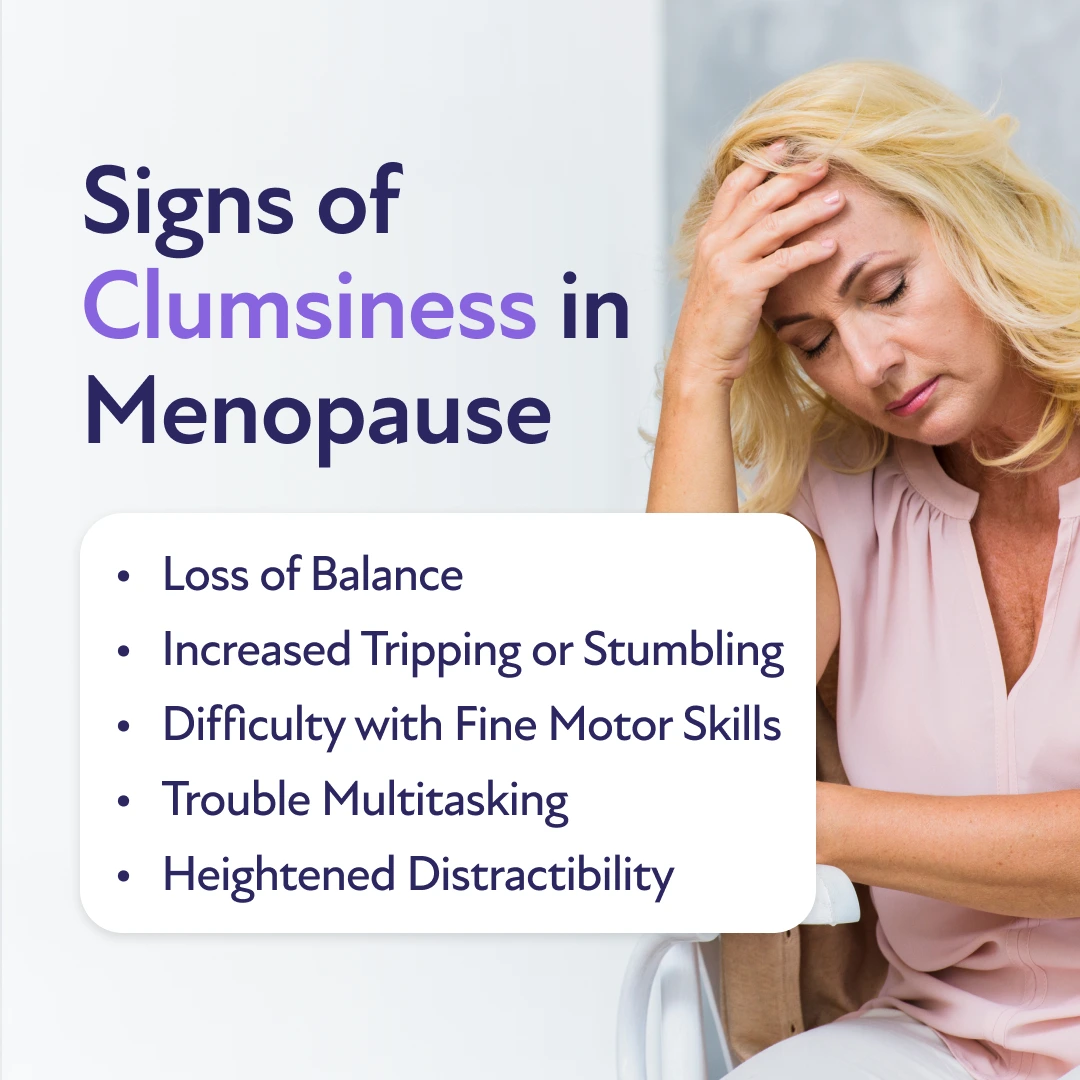Menopause brings numerous physical and emotional changes, but clumsiness is a symptom that often goes unnoticed. Feeling unsteady, tripping more often, or experiencing difficulty with coordination can be surprising, yet these changes can be linked to hormonal shifts during perimenopause and menopause. Understanding the causes, symptoms, and potential treatments for clumsiness can help in managing this lesser-known symptom of menopause.
What causes menopausal clumsiness?
Neuromuscular Changes and Hormonal Shifts
Neuromuscular mechanisms refer to how nerves and muscles work together to control movement and balance. During perimenopause, hormonal changes can affect this system. Research has found that declining estrogen levels in late perimenopause may disrupt how nerves and muscles communicate, speeding up the aging process of this system.(1)
Effects on Balance and Mobility
Postural balance and functional mobility, such as staying steady while walking or standing, can be significantly affected by menopausal symptoms. One study showed that the severity of menopause symptoms correlates with reduced balance and mobility in middle-aged postmenopausal women, highlighting the importance of managing these symptoms to maintain physical stability.(2)(3)
Balance Issues and the Vestibular System
The vestibular system, which helps with balance and spatial awareness, can be impacted by hormonal shifts during menopause. Research has found that lower estrogen levels may make women more prone to balance problems and unsteadiness.(3)(4)
Other Factors Contributing to Menopausal Clumsiness
Sleep Disturbances: Insomnia or fragmented sleep common in menopause can impair concentration and reaction time.(2)
Brain Fog: Cognitive changes associated with menopause, including memory lapses and decreased focus, may impact multitasking and physical coordination.
Fatigue: Chronic tiredness can impact alertness and increase the likelihood of accidents or missteps.(2)
Symptoms of Menopausal Clumsiness
Menopausal clumsiness manifests in various ways. Common signs include the following:(1)(2)(3)(4)
Loss of Balance: A sensation of instability while walking or standing
Increased Tripping or Stumbling: More frequent missteps on flat surfaces or stairs
Difficulty with Fine Motor Skills: Struggling to perform tasks that require precise movements, such as typing or buttoning clothes
Trouble Multitasking: Challenges in managing multiple tasks simultaneously, such as walking while holding objects
Heightened Distractibility: Difficulty maintaining focus during routine activities

How to Treat Lack of Coordination During Menopause
While menopausal clumsiness can be frustrating, several strategies can help manage and mitigate its effects:(1)(2)(3)
Exercising Regularly: Strengthening muscles through weight training, yoga, or pilates improves stability and coordination. Balance-specific exercises, such as tai chi, can also be beneficial. Neuromuscular training (NMT) that targets balance and coordination may help counteract the effects of hormonal changes.
Improving Sleep Hygiene: This includes prioritizing restful sleep by maintaining a consistent sleep schedule, creating a relaxing bedtime routine, and minimizing caffeine or screen exposure before bed.
Staying Hydrated: Dehydration can exacerbate fatigue and dizziness, impacting balance.
Engaging the Mind: Activities like puzzles, games, or hobbies that require focus and precision can help sharpen coordination and cognitive functions.
Addressing Vestibular Health: If balance issues stem from vestibular disturbances, consulting a healthcare provider for potential vestibular rehabilitation therapy may provide relief.
Considering Hormone Replacement Therapy (HRT): For those significantly affected by menopause symptoms, HRT can help stabilize hormone levels and alleviate coordination issues.
When to See a Doctor for Menopausal Balance Problems
Occasional clumsiness is common, but persistent or severe balance issues may warrant medical evaluation. A healthcare provider can rule out other potential causes, such as neurological conditions, vitamin deficiencies, or inner ear problems. Seeking advice from a physician trained in menopause can provide tailored guidance and treatment options.(2)(3)(4)
No one enjoys feeling clumsy or unsteady, especially when juggling a career, family, and social obligations. Identifying the underlying causes of clumsiness and implementing effective management strategies can help individuals maintain confidence during daily activities.
Struggling with clumsiness during menopause? Discover if HRT is right for you.
If you’ve entered the menopause transition and are dealing with a lack of coordination, you’re not alone. Take our brief menopause quiz to see if you’re an eligible candidate for HRT. Get started with Winona to take the first step toward feeling better.


